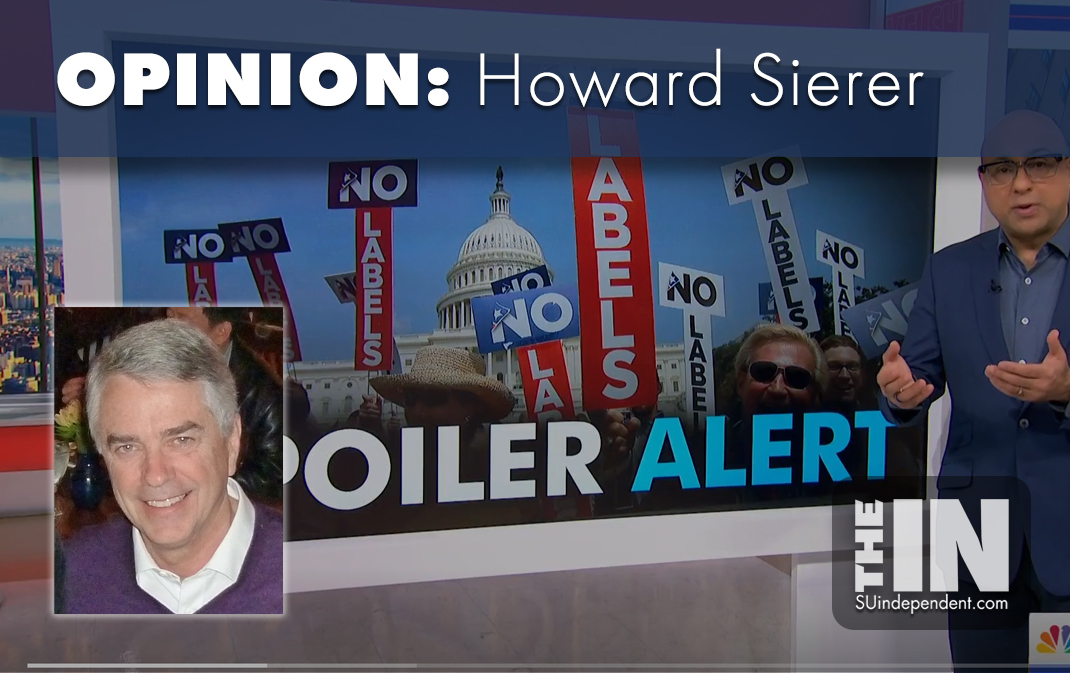
No “No Labels”
– By Howard Sierer –
Dissatisfied with both President Biden and former President Trump, a group of centrist political operatives and strategists who call themselves “No Labels” set about finding a presidential candidate consistent with its tagline, “Home for the Commonsense Majority.” After getting a lot of national media attention over the last six months, they couldn’t find a high-profile centrist willing to run.
Like many voters, the idea of a centrist third-party candidate is appealing to me, a candidate who reflects the ideas and views of the majority of us who are not on the radical progressive left or the hard right. Robert Kennedy, the only other remaining nationally recognizable name in the contest, is burdened with a number of non-mainstream positions – “no vaccine is safe and effective” – and doesn’t fill the empty center of the political spectrum.
The third-party idea is especially attractive this year with neither of the presumptive candidates liked by a majority of voters. But the fuzzy glow would come off the third-party idea if a candidate were actually named and a party platform announced. Inevitably, the chosen candidate will have supported a mixed bag of policies in the past, some of which each centrist-minded voter will have supported and others to which he/she was opposed.
The party platform would likewise take positions on controversial issues like abortion, illegal immigration, gender change, and teaching critical race theory. Most voters have strong, pre-conceived notions about these and other topics, shaped in recent years by their choice of media outlets. A centrist platform would take positions that would seem too left-wing for right-leaning centrist voters and other positions too right-wing to left-leaning centrists, no matter how moderately they were stated.
A factor that would weigh the minds of voters considering a vote for a third-party candidate: “Am I throwing away my vote? I might not think much of either major party candidate but I could live with Candidate X but would never want Candidate Y to win. Maybe I should hold my nose and vote for X.” That was my dilemma in 2020 when I chose to vote for Trump.
Yet another concern when considering a vote for a so-called centrist candidate: if elected, will that person govern from the center, or will he/she drift either right or left? Two examples of wolves in sheep’s clothing should be fresh in Utah voters’ minds.
Pres. Biden ran as a centrist Democrat in 2020, an alternative to then-leading radical progressive Sen. Bernie Sanders. Biden vowed “not to divide but to unify” the country in his victory speech. But from his first day in office, he fully embraced the Sanders’ radical progressive agenda that he promised voters he would reject. No president in the history of the country has pulled such a complete “bait and switch” on the electorate.
Utah has experienced its own version of position drift by an avowed centrist candidate. The state’s own Evan McMullin ran for president as an independent candidate in 2016, garnering 21.5% of Utah’s presidential vote, including mine, and over 725,000 votes nationwide. His success in Utah reflected many voters’ dislike of Donald Trump.
Trying a second time for elective office in Utah, McMullin ran for U.S. Senate in 2022 as an independent. Belying his centrist claims, McMullin opposed overturning of Roe v. Wade, supported no federal restrictions on abortion, supported gun control, opposed the filibuster, supported teaching critical race theory in schools, and said he ‘would probably have supported Supreme Court Justice Ketanji Brown Jackson.’” Republicans can only wonder how much of this progressive agenda McMullin would have followed had he been elected president in 2016.
The Republican establishment tends to see any centrist member of its party as a Republican in name only (RINO). Sen. Mitt Romney has been tarred with that brush for his entire six-year term. Any attempt at compromise by party moderates meets kneejerk objections by those farther right.
Many voters – and I’m one – continue to complain about our polarized two-party system. The political views of the public at large tend to be distributed like a classic bell-shaped curve, while the views and actions of our elected representatives look far more like a barbell with weights at both ends.
It’s not clear how this dichotomy can or will be resolved. But until that happy day, I can predict with certainty that our next president will have received a majority of Electoral College votes but will be disliked by over half the voters from day one.
The only good news is that thanks to the 25th Amendment, our next president will only be able to serve one term.




I almost voted for McMullin, and at the last minute I did not because of some positions he had verbalized previous to throwing his hat in the ring. There were a lot of people who said he was a wolf in sheep’s clothing and indeed, considering his subsequent positions, he was. I have since learned from credible sources that there are actual classes that the left puts on for candidates to learn how to run as a Republican candidate complete with the right positions and phraseology. A couple of these have been verified and I’m sure there are more in other states. it would explain why Romney and Adam Kinzinger, who I voted for when I lived in Illinois, started out with a light countenance and professed conservative/constitutional views, and then suddenly seemed to turn to the dark side and embrace, and even vote with Democrats on unconstitutional issues. And both of them seemed to take on a dark countenance after that.